
The years between his intellectual beginnings and the crisis of 1879 (the year of publication of Human All Too Human and the beginning of his activity as a “wandering philosopher”) are for Nietzsche a period of attempts to articulate for science the possibility of a creative impulse for the future while at the same time preserving its scientific character. It is a vocation ultimately called to overcome the structural crossroads in which modern science had been trapped between positivity and ideal by redefining the relation of science to life. As a result of this task, he produces a series of well-known cycles and conferences in which the conflict of philology with itself is perceived in the abstract.
NIETZSCHE ON EARLY GREEK PHILOSOPHY | ONLINE SEMINAR
Org. Paulo Lima (Lisbon Nietzsche Group/Research Group on Ancient Philosophy/IFILNOVA) and Carlotta Santini (CNRS/ENS, Paris)
The seminar seeks to explore the dialogue between Nietzsche and early Greek philosophy during the period when he was Professor of Philology at the University of Basel. This is a subject that has not been studied in a systematic way, although there are some decisive contributions showing its importance for understanding Nietzsche’s philological and philosophical thinking. Our purpose is to provide a platform on which contributions from specialists in Nietzsche and ancient philosophy can be presented, debated, and complemented to fill this gap in Nietzschean studies. Key topics of the sessions will be Nietzsche’s activity as a scholar of ancient doxography on early Greek philosophy, his general conception of what he called the “pre-Platonic philosophers”, as well as his interpretation of some of these philosophers. The body of texts to be studied during the sessions includes not only the published ones, but also Nietzsche’s lectures, notebooks, and correspondence. The seminar is part of the activities of the Lisbon Nietzsche Group and the Research Group on Ancient Philosophy (CultureLab/IFILNOVA). It is the result of a collaboration between IFILNOVA, the Centre Nationale de Recherche Scientifique, and the École Normale Supérieure (Paris). It will take place monthly starting from October 2023 and will have nine sessions. It will be open to all interested parties, who will be able to register for each session by contacting the organizers (plima@fcsh.unl.pt, carlottasantini@hotmail.it). For more details, please see the programme below.
NEXT SESSIONS
Session 28 November, 4 PM (Lisbon) | 5 PM (Rome)
Eduardo Nasser (Universidade Federal de Pernambuco), “Considerations on Nietzsche’s Use of Anaxagoras in His Quarrel with Eleatism”
Session 36 December, 4 PM (Lisbon) | 5 PM (Rome)
Babette Babich (Fordham University), “To Hell and Back: Nietzsche’s Empedocles, Nietzsche’s Pythagoras, and Zarathustra”
Session 417 January, 4 PM (Lisbon) | 5 PM (Rome)
Matthew Meyer (University of Scranton), “The Unity of Opposites: A Fundamental Principle in Antiquity and Today”
Session 531 January, 4 PM (Lisbon) | 5 PM (Rome)
Helmut Heit (Nietzsche Kolleg), “Nietzsche and Protagoras”
Session 628 February, 4 PM (Lisbon) | 5 PM (Rome)
Anne Merker (Université de Strasbourg), “Nietzsche, Heraclitus, and Polemos”
Session 727 March, 4 PM (Lisbon) | 5 PM (Rome)
Yannick Souladié (ENS, Paris), “The ‘Tremendous Leap of Anaximander’: Nietzsche’s New Understanding of the Apeiron”
Session 88 May, 4 PM (Lisbon) | 5 PM (Rome)
André Laks (Universidad Panamericana, México/Sorbonne Université, Paris): “Nietzsche doxographus”
Session 95 June, 4 PM (Lisbon) | 5 PM (Rome)
Daniel Conway (Texas A&M University), “How Socrates Became What he Was: The Evolution of a Diagnosis”
 Mark as favourite
Mark as favourite